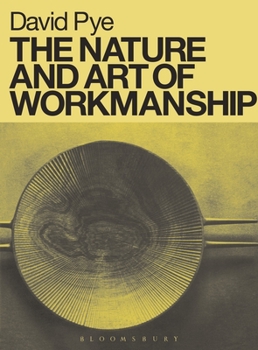The Nature and Art of Workmanship
Select Format
Select Condition 
Book Overview
The Nature and Art of Workmanship is one of the classic books on craftsmanship and design. David Pye explores the meaning of skill and its relationship to design and manufacturing. Cutting through a century of fuzzy thinking, he proposes a new theory of making based on the concept of good workmanship and shows how it imparts all-important diversity to our visual environment.
Format:Paperback
Language:English
ISBN:0713689315
ISBN13:9780713689310
Release Date:July 2008
Publisher:Bloomsbury Publishing PLC
Length:144 Pages
Weight:0.84 lbs.
Dimensions:0.2" x 8.2" x 10.8"
Customer Reviews
5 ratings
A wonderful book on the philosophy of craft
Published by Thriftbooks.com User , 14 years ago
Other reviews have already set out the details; I'll merely add that I enjoyed reading it and it's had a profound effect on how I view my own craftwork. Realize that it is a craftsman's philosophical reflections, not a how-to manual of craft practice, nor as one negative review lamented, about quality control.
great book
Published by Thriftbooks.com User , 18 years ago
This book should be read by all designers. Pyes understanding of materials and processes, and their relationship to design, is an inspiration.
Great material but book design is worst I've seen
Published by Thriftbooks.com User , 19 years ago
Since previous reviewers have expressed my own positive opinions of this classic, I shall not repeat. However, for a book that purports to deal with aesthetics and workmanship, this book's physical layout is a joke. It is so bad that it offends. The inner gutter is so narrow that the book as actually difficult to read and it turns an enjoyable experience into a physical chore. Are the publishers amateurs who happened to come upon some page layout software?
Workmanship as a personal statement
Published by Thriftbooks.com User , 19 years ago
Pye knows that understanding comes in two steps. The second presents the new knowledge, but the first step clears out old fallacies to make way for the new facts. To do that, he starts this book by thoroughly confusing the question of what is hand work, and what is done by machine. Once that is shown irrelevant, he starts on the points that truly matter. First, the terms "craft" and "craftsmanship" have been co-opted and corrupted by so many authors that, with regret, he abandons them. Instead, he defines new terms. The first opposed pairs are the workmanship of risk and the workmanship of certainty. Certainty is knowledge that a piece of work will surely complete in the way intended, as is typical in mass manufacture. Risk is the chance that any workpiece could be damaged or destroyed at any step in its handling - a chisel could clip, a hammer could damage the surface, a saw cut might be placed wrong. It doesn't matter whether the tool is a simple hammer or a complex milling machine: either a reliable process or a fallible workman defines the result. Pye's second distinction is "regulated" versus "free" or "rough" fabrication. Regulated work meets fine tolerances, has precise geometries and surfaces. Free work allows the workman to vary the workpiece somewhat. Free workmanship allows expressive notes, perhaps tool textures or subtle changes of shape. Rough workmanship goes farther. A wood fence, for example, may be straight and strong enough, with coarse shapes, knots in the wood, and even some checking. None of that distinguishes good workmanship from bad. Good workmanship carries out the practical and esthetic intent of a design, or improves on them. Bad workmanship detracts from the design's usefulness or beauty. In something like a rural stone wall, excessively regulated work might even be considered bad, if it's the one exact geometry in a generally relaxed environment. A rough-hewn bench may be just as good, in its way, as an inlaid Victorian table. Pye ends this wise book by reviewing what Ruskin and Morris had to say about craft. I won't repeat his arguments, but he points out the reams of nonsense they interleaved between pages of meaningful thought. As with everything he analyzes, he carefully highlights the worthwhile, and elegantly tears up the romantic silliness. Pye is truly dedicated to workmanship and to dedicated workmen (and, implicitly, women). I recommend this book to anyone who creates anything, whether professionally or for the personal reward in the act of making. //wiredweird
A great book that lives up to expectations
Published by Thriftbooks.com User , 23 years ago
In this book David Pye accurately and concisely differentiates between hand craftsmanship and modern machine done work. He writes his philosophical yet practical, personal ideas on craftsmanship. It is a great discussion for anyone interested in fine workmanship. It attempts to answer questions (or at least provide an entry point into discussion) of why hand workmanship is important, why it appeals to us, and want makes it fundamentally different from machine build crafts. It does not focus on any specific craft (thought Professor Pye is a woodworker himself), but is meaningful and accessable to anyone interested in crafts and hand workmanship. This is a great book.




